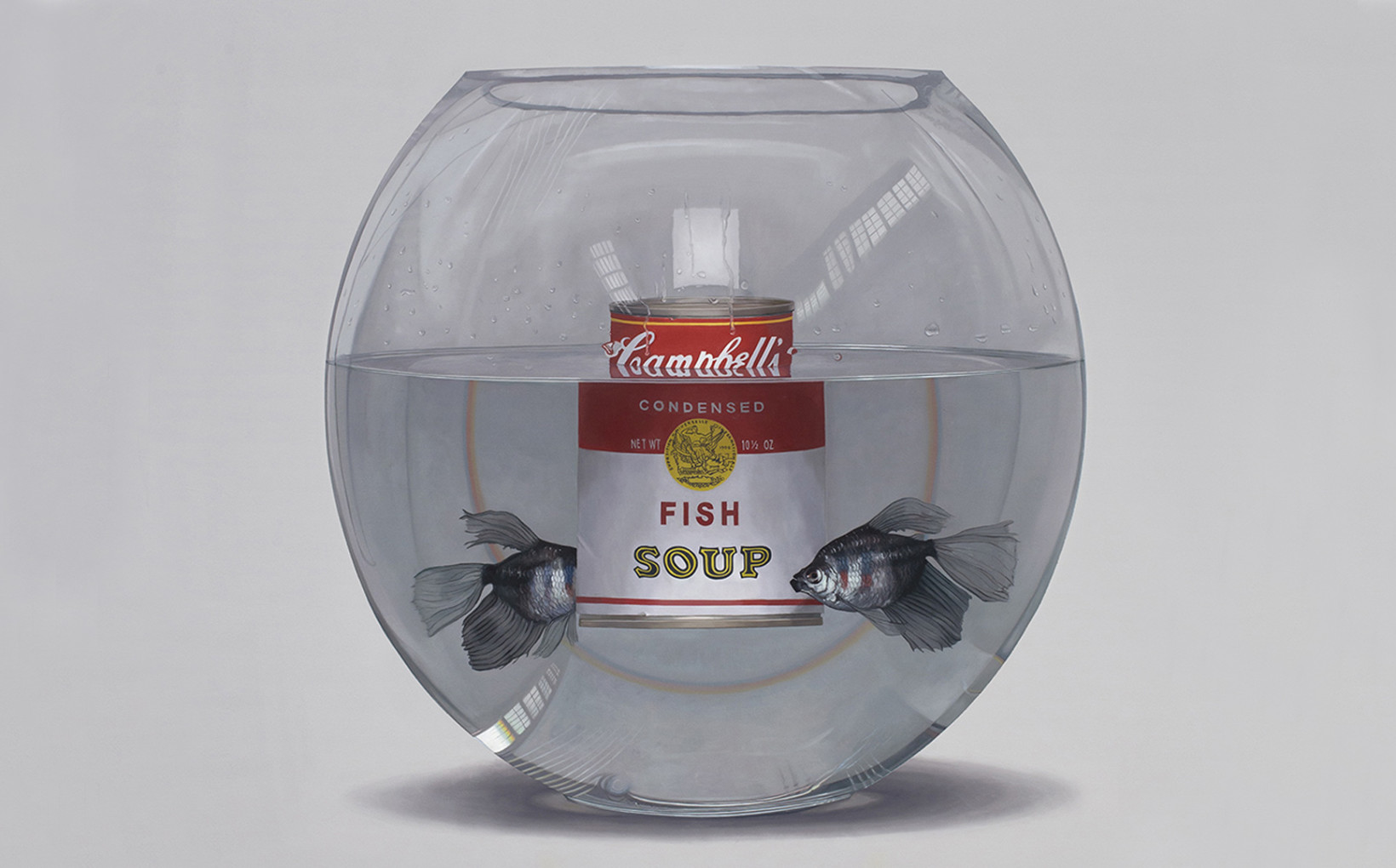
Born 1977
Lives and works in Sydney
Represented by nanda\hobbs

In a contemporary exploration of the tensions between man and nature, Jonathan Dalton urges us to consider where power is truly vested and its consequential impact. Yet, unlike the Romantic artists of the early 19th century, who—responding to the Industrial Revolution—depicted nature as an all-powerful force, Dalton avoids overt cautionary tales, instead imploring us to scrutinise our complex relationship with nature and reach our own conclusions.
Dalton’s latest exhibition, This brutal, muted serenity, posits the idea that man is able to contain nature—inevitably to its detriment. While artists such as Turner depicted man dwarfed by tumultuous, seemingly infinite seas, Dalton takes a more restrained approach and serves up the ‘man versus nature’ interplay in the microcosm of the fishbowl—the ultimate viewing vessel. Here, Dalton distils this complex relationship into elemental forms, allowing the viewer to question society’s insatiable demand for commodities and consider its implications for the natural world.
The genesis of this exhibition—An Ode to Jeanne-Claude and Christo—pays homage to the like-minded partners who explored the relationship between art, the artificial and the natural by collecting detritus to create enveloped natural forms. Dalton’s smaller-scale appropriation presents the viewer with a wrapped form—our inability to see the parcel’s contents forcing us to appreciate what is often taken for granted. What lies beneath is only confirmed when viewed in conjunction with the other works in this exhibition. The balance of his suite of works—a series of fish bowls containing man-made items jarringly inhabiting the same space as the fish—prompt us to question our regard for nature.
We live in a capitalist world—one that treasures man-made belongings and attributes a sentimental value to them. By juxtaposing the artificial with the organic in the otherwise pristine environment of the fish bowl, the artist simultaneously monumentalises the prized man-made items while submerging them in water to strip them of their meaning. They lose their original function. They become discarded artefacts—beautiful relics. The submerged items also become a quiet acknowledgement of man’s disregard for nature and its resultant impact; rising sea levels due to climate change being notably harmful.
As a student of philosophy, Dalton challenges us to decipher meaning from his flawless stage sets. His choices of man-made items for his fish bowls are incisive, using cultural objects to critique our capitalist propensities. Whether it is a Polaroid camera or a pre-1970’s transistor radio from Japan, Dalton pays homage to those objects we covet while simultaneously depriving them of purpose.
Dalton’s painting—Two Fish Visit their Friends in the City—is a patent tribute to Andy Warhol’s Campbell’s Soup Cans and is similarly a comment on our consumerist predilections. Much like Warhol, Dalton takes the mass-produced object and situates it centre stage. Playful in his approach, Dalton invites us to view layers of containment; goldish swimming around a can of fish soup, enjoying relative freedom in the captivity of the bowl.
Through its religious undertones, The Seven Cardinal Sins and Mr Koons asks us to contemplate notions of excess—trivialising the value we attribute to often kitsch cultural objects. The gold, mirrored dog is reduced and stripped of its worth—surrounded by a school of fish swimming disinterestedly around this archetype of abundance. The fish ascribe no value to Koon’s dog and are oblivious to man’s impact on their environment. It is this subtle symbolism, coupled with the artist’s technical prowess, that positions Dalton as a master of his craft.
Dalton’s meticulously rendered canvases are imbued with his wry sense of humour and a nuanced drama. The theatrical nature of his work offers a dimension beyond conventional photorealistic representations. By presenting the natural alongside the artificial in these open vessels, we are invited to unpack the imagery before us—to scrutinise our societal values and to be cognisant of our ongoing impact on the natural world.
Nicole Hauser
November, 2021
View feature article about Dalton All is in order, Art Collector, Edition #98 Oct–Dec 2021, by Luke Létourneau
An extensive article about Jonathan Dalton's current exhibition This brutal, muted serenity by Luke Létourneau is featured in the current edition of Art Collector magazine.
Your monthly art news on the run plus invitations to Nanda\Hobbs exhibitions and events